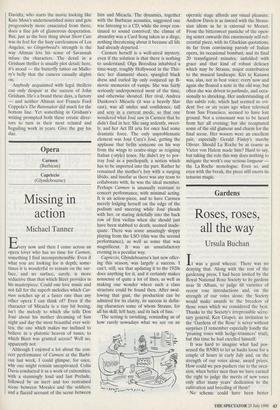Opera
Capriccio (Glyndebourne)
Missing in action
Michael Tanner
Every now and then I come across an opera lover who has no time for Carmen, something I find incomprehensible. Even if what you are looking for is depth, some- times it is wonderful to remain on the sur- face, and no surface, surely, is more seductive than that which Bizet provides in his masterpiece. Could one love music and not fall for the superb melodies which Car- men notches up at a faster rate than any other opera I can think of? Even if the character of Micaela is a tiny bit boring, isn't the melody to which she tells Don Jose about his mother dreaming of him night and day the most beautiful ever writ- ten, the one which makes me inclined to believe in a platonic heaven of tunes, to which Bizet was granted access? Well no, apparently not.
Although I enjoyed a lot about the con- cert performance of Carmen at the Barbi- can last week, I could glimpse, for once, why one might remain uncaptivated. Colin Davis conducted it as a work of extremities, with a stunningly loud and fast Prelude, followed by an inert and too restrained scene between Morales and the soldiers, and a flaccid account of the scene between him and Micaela. The dynamics, together with the Barbican acoustics, suggested one was listening to a CD, while the tempi con- tinued to sound contrived; the climax of absurdity was a Card Song taken as a dirge, nothing threatening about it because all life had already departed.
Carmen herself is a well-aired mystery, even if the solution is that there is nothing to understand. Olga Borodina inhabited a time-warp, roughly Hollywood in the Thir- ties; her diamante shoes, spangled black dress and curled lip only conjured up B- movie memories of vamps. She was fairly seriously underpowered most of the time, and otherwise shouted. Her rival, Andrea Dankova's Micaela (it was a heavily Slav cast), was all smiles and confidence, tall and sexy in a current mode, so that one wondered what Jose saw in Carmen that he didn't find in her. She sang ardently, sweet- ly, and her Act III aria for once had some dramatic force. The only unproblematic element was Jose Cura's Jose, getting the applause that befits someone on his way from the wings to centre-stage as reigning Italian (-style) tenor. He didn't try to por- tray Jose as a psychopath, a notion which has to be imported into the part. Rather he remained the mother's boy with a surging libido, and insofar as there was any team to collaborate with, he was the ideal member. Perhaps Carmen is unusually resistant to concert performance, with minimal acting. It is an action-piece, and to have Carmen merely lodging herself on the edge of the podium and sneering while Jose pleads with her, or staring dolefully into the back row of first violins when she should just have been stabbed to death, seemed inade- quate. There was some amazingly sloppy playing from the LSO (this was the second performance), as well as some that was magnificent. It was an unsatisfactory evening in a peculiar way.
Capriccio, Glyndeboume's last new offer- ing this season, was largely a success. I can't, still, see that updating it to the 1920s does anything for it, and it certainly makes nonsense of quite a lot of lines, as well as making one wonder where such a class structure could be found then. After swal- lowing that gnat, the production can be admired for its clarity, its success in defin- ing characters some of whom Strauss, for all his skill, left hazy, and its lack of fuss.
The setting is ravishing, reminding us of how rarely nowadays what we see on an operatic stage affords any visual pleasure. Andrew Davis is as inward with the Straus- sian idiom as he is external to Mozart. From the bittersweet pastiche of the open- ing sextet onwards this enormously self-ref- erential piece, with its Gluckian quotations, its far from convincing parody of Italian opera, its occasional bombast, and its final 20 transfigured minutes, Unfolded with grace and that kind of robust delicacy which may be Strauss, major contribution to the musical landscape. Kin i te Kanawa was, alas, not in best voice; every now and again she floated a note in the old way, but often she was driven to parlando, and occa- sionally to shrieking. Her understanding of this subtle role, which had seemed so evi- dent five or six years ago when televised from San Francisco, seemed to have lost ground. Not a consonant was to be heard from her all evening; but she recaptured some of the old glamour and charm for the final scene. Her wooers were an excellent pair, especially Gerald Finley's starchy Olivier. Should La Roche be as coarse as Victor von Halem made him? Hard to say, but taking the role this way does nothing to mitigate the work's one serious longueur — the La Roche monologue. Even so, and even with the break, the piece still exerts its tenuous magic.


























































 Previous page
Previous page